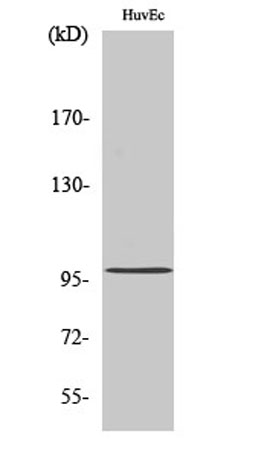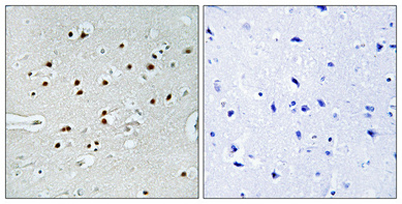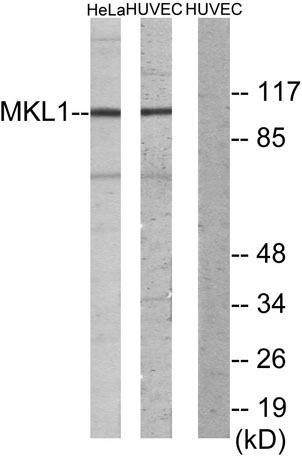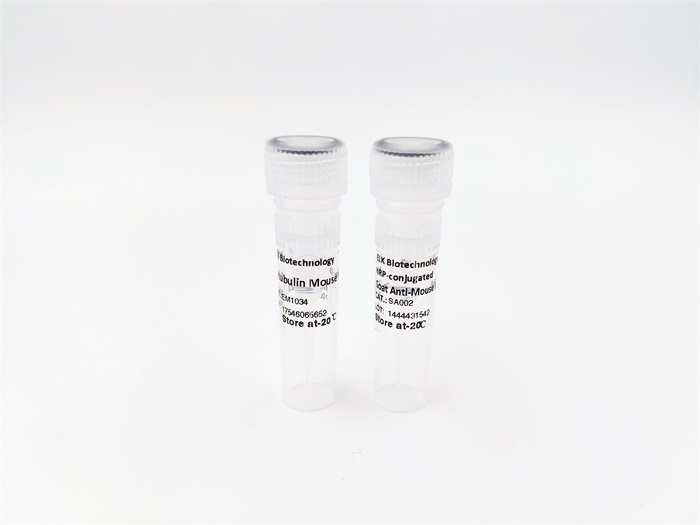








MRTF-A rabbit pAb
 One-click to copy product information
One-click to copy product information$148.00/50µL $248.00/100µL
| 50 µL | $148.00 |
| 100 µL | $248.00 |
Overview
| Product name: | MRTF-A rabbit pAb |
| Reactivity: | Human;Mouse |
| Alternative Names: | MKL1; KIAA1438; MAL; MKL/myocardin-like protein 1; Megakaryoblastic leukemia 1 protein; Megakaryocytic acute leukemia protein; Myocardin-related transcription factor A; MRTF-A |
| Source: | Rabbit |
| Dilutions: | Western Blot: 1/500 - 1/2000. Immunohistochemistry: 1/100 - 1/300. ELISA: 1/5000. Not yet tested in other applications. |
| Immunogen: | The antiserum was produced against synthesized peptide derived from human MKL1. AA range:10-59 |
| Storage: | -20°C/1 year |
| Clonality: | Polyclonal |
| Isotype: | IgG |
| Concentration: | 1 mg/ml |
| Observed Band: | 99kD |
| GeneID: | 57591 |
| Human Swiss-Prot No: | Q969V6 |
| Cellular localization: | Cytoplasm . Nucleus . Subcellular location is tightly regulated by actin both in cytoplasm and nucleus: high levels of G-actin in the nucleus observed during serum deprivation lead to low levels of nuclear MRTFA, while reduced levels of nuclear G-actin result in accumulation of MRTFA in the nucleus (By similarity). G-actin-binding in the cytoplasm inhibits nuclear import by masking the nuclear localization signal (NLS) (By similarity). In contrast, binding to nuclear globular actin (G-actin) promotes nuclear export to the cytoplasm (By similarity). Nuclear localization is regulated by MICAL2, which mediates depolymerization of nuclear actin, which decreases nuclear G-actin pool, thereby promoting retention of MRTFA in the nucleus and subsequent formation of an active complex with SRF (PubM |
| Background: | The protein encoded by this gene interacts with the transcription factor myocardin, a key regulator of smooth muscle cell differentiation. The encoded protein is predominantly nuclear and may help transduce signals from the cytoskeleton to the nucleus. This gene is involved in a specific translocation event that creates a fusion of this gene and the RNA-binding motif protein-15 gene. This translocation has been associated with acute megakaryocytic leukemia. Alternative splicing results in multiple transcript variants. [provided by RefSeq, Sep 2013], |
-
 Western Blot analysis of various cells using MRTF-A Polyclonal Antibody
Western Blot analysis of various cells using MRTF-A Polyclonal Antibody -
 Immunohistochemical analysis of paraffin-embedded Human brain. Antibody was diluted at 1:100(4° overnight). High-pressure and temperature Tris-EDTA,pH8.0 was used for antigen retrieval. Negetive contrl (right) obtaned from antibody was pre-absorbed by i
Immunohistochemical analysis of paraffin-embedded Human brain. Antibody was diluted at 1:100(4° overnight). High-pressure and temperature Tris-EDTA,pH8.0 was used for antigen retrieval. Negetive contrl (right) obtaned from antibody was pre-absorbed by i -
 Western blot analysis of lysates from HUVEC and HeLa cells, using MKL1 Antibody. The lane on the right is blocked with the synthesized peptide.
Western blot analysis of lysates from HUVEC and HeLa cells, using MKL1 Antibody. The lane on the right is blocked with the synthesized peptide.

 Manual
Manual